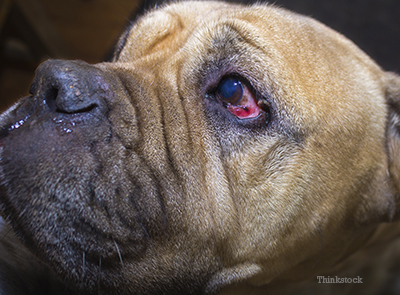 eye lashes and skin around the eye have direct contact with the cornea1. It can affect both eyes and both upper and lower eyelids. Although it can occur in cats it is far more common in dogs.
eye lashes and skin around the eye have direct contact with the cornea1. It can affect both eyes and both upper and lower eyelids. Although it can occur in cats it is far more common in dogs. Causes of entropion in dogs
Entropion can be congenital or acquired. Congenital entropion is generally the result of an anatomic defect while acquired entropion is generally the result of trauma or spasm.
Entropion can occur in any individual of any breed but there is probably a hereditary component to canine entropion. It’s commonly seen in Chow Chows, Shar-Peis, Bull Mastiffs, Rottweilers, Great Danes and St. Bernards2.
Symptoms of entropion in dogs
In most cases, the skin and hair that rub over the surface of the eye result in irritation and pain. The animal will often squint their eyes, have watery eyes and pain associated with possible corneal abrasions1. Chronic inflammation can result in scarring and impact vision negatively. It is common for dogs with entropion to paw at their eyes due to discomfort.
Prognosis of entropion in dogs
The short term prognosis can be guarded if secondary trauma and self injury have occurred. Entropion and resultant inflammation can result in ulcerations or abrasions of the cornea.
The long term prognosis—with timely and appropriate intervention—is generally very good. Entropion requires surgical treatment but successful surgery means your dog should be fine.
Treatment of entropion in dogs
The only way to effectively treat entropion is to surgically roll the inverted portion of the eye lid back out. In cases not occurring in conjunction with ectropion (Click here to learn about canine ectropion.) the surgical approach is generally relatively simple but can be delicate and requires an experienced surgeon. Concurrent entropion and ectropion can present a very challenging surgical problem.
Prevention of entropion in dogs
Acquired or secondary entropion associated with trauma can be prevented or at least reduced by having any eye injury examined and treated.
Hereditary or congenital entropion probably has some genetic component. To prevent any hereditary condition means reducing the likelihood of transfer of the gene to the new generation. Affected individuals should be eliminated from breeding programs.
As with any illness or medical condition be sure to consult your veterinarian at once of your dog seems to be having any eye problems.
Questions to ask your veterinarian
- My puppy’s eyes water a lot and he tends to squint. Should I be concerned?
- How will we know if my dog has ectropion too?
If you have any questions or concerns, you should always visit or call your veterinarian -- they are your best resource to ensure the health and well-being of your pets.
Resources:
1."Canine Eyelid Diseases." Animal Eye Care LLC. N.p., n.d. Web. 9 Jan. 2015. <http%3A%2F%2Fanimaleyecare.net%2Fdiseases%2Fcanine%2F>.
2. McLeod, DVM Lianne. "Entropion in Dogs and Cats - Treatment." About.com. Web. 09 Jan. 2015. <http://vetmedicine.about.com/od/diseasesandconditions/a/CW-Entropion.htm>.
Related symptoms:
Reviewed on:
Friday, January 9, 2015
